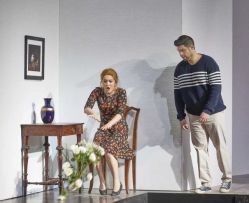Chamber opera in 6 pictures
Libretto by Karl Michael von Levetzow
New production of Theater an der Wien at Kammeroper
Staged new version by Roland Geyer
of the opera of the same name by Ottmar Gerster (1936)
Chamber version by Matthias Wegele
Premiere:
Tuesday, 17 May 2022, 7 pm until 8.30 pm
(no intermission)
Performances:
20 | 23 | 25 | 30 May 2022, 7 pm until 8.30 pm
(no intermission)
2 | 8 | 11 June 2022, 7 pm
(no intermission)
Introduction matinée:
Sunday, 15 May 2022, 11 am
(no intermission)
In German with German surtitles
Cast
Synopsis
Years ago Enoch Arden was shipwrecked on a desert island during a raging storm. All alone he ekes out a miserable existence and any hope that a ship may one day pass by and rescue him is all but gone. That fateful voyage was to have been his last: one more successful trip was needed for him to earn enough money to buy a little house in the country for his wife Annemarie and his young son, the house that Annemarie had dreamed of. Arden’s thoughts repeatedly return to this last farewell. His wife had been filled with a sense of foreboding and had tried in vain to stop her husband from going through with his plans. But after one last loving dance Arden had gone on board. His friend Klas had agreed to keep an eye on Annemarie and their son and, should the need arise, support them – a dangerous course since Klas and Annemarie had been a couple before Arden appeared on the scene. In his solitude the shipwrecked sailor is tormented by jealousy: he sees Annemarie at Klas’s side, their love rekindled. But they cannot marry because it has not yet been possible to have Arden declared dead. A message in a bottle is then found that seems to suggest that he has been shipwrecked. Now there is nothing to stop their marrying and they gaily celebrate the eve of the wedding. On his island, Arden keeps a fire burning, day in, day out, but to no avail. He has still not been spotted by a ship. In the end, his will to live in hopes of seeing his family again fades completely away. Arden is preparing to end his life when he thinks he sees a ship on the horizon. In his home village celebrations are in full swing to mark his son’s first voyage. No one recognises the homecoming Arden. When he reveals his true identity to Klas, Arden’s worst fears are realised: Klas and Annemarie are married. His first impulse is to attack his friend, but then he agrees to let Annemarie decide what should happen. If she recognises Arden Klas is willing to let her go. But Annemarie does not recognise her husband in the leathery-skinned and emaciated old man and passes him by without a glance. Enoch Arden throws himself into the sea.
About the opera
Ottmar Gerster’s Enoch Arden or Der Möwenschrei was one of the most successful operas of the twentieth century, even though most opera guides of more recent date make no mention of it. The premiere on 15 November 1936 in Düsseldorf was extraordinarily successful and the opera was given in over fifty theatres in the years that followed – not only in the German-speaking world (for example in Linz in 1940 and Graz in 1942), but also in Finland, Romania and Italy. After 1945 the homecoming tragedy experienced a veritable renaissance: in the post-war years it struck a chord, especially in the German Democratic Republic where the full work was released on LP. But in the 1960s it was largely forgotten there too. Compared to the compositions of his successful contemporaries such as Franz Schreker, Igor Stravinsky and Richard Strauss, who had written a melodrama based on the same material, Tennyson’s narrative poem, in 1897, Gerster’s music may initially appear somewhat simplistic. However, it proves highly effective for the subject matter and as a stage work. Ottmar Gerster’s Enoch Arden can be seen as a last example of veristic opera culture with a style that can be placed between d’Alberts Tiefland and Hindemith’s Mathis der Maler. Dances and songs with memorable melodies stand side by side with fugues and austere polyphony. One of the composer’s foremost principles throughout his life was to create music that is also accessible to people with no musical training. Having, like his friend and colleague Paul Hindemith, been musically socialised in the 1920s by holding positions such as conductor of workers’ choruses, Ottmar Gerster was later also able to identify with the aesthetic and political precepts that determined National Socialist cultural policy. This was also the case in the GDR which became the composer’s home from 1947 and where he not only received numerous awards but also a professorship at the Music Academy in Leipzig and was elected Chairman of the Association of Composers. A special, innovative approach is now planned to reopen the discourse on the dramatic potential of Enoch Arden as a work symptomatic of the style prevalent at the time of its creation.











